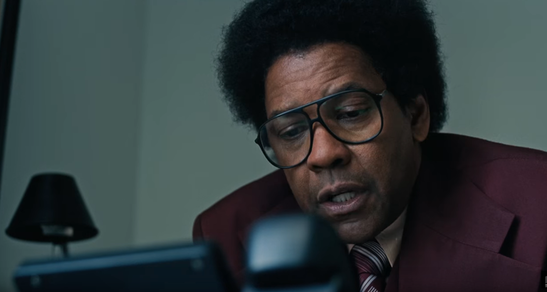|
“We live in an era of migrating corporations. In order to escape organized labor in this country – and this higher wages, benefits, and so on – corporations roam the world in search of nations providing cheap labor pools…Huge numbers of people lose jobs and prospects for future jobs. Because the economic base of these communities is destroyed, education and other surviving social services are profoundly affected. This process turns the men, women, and children who lives in these damaged communities into perfect candidates for prison.”
We are introduced to the title character of Roman J. Israel, Esq., (Denzel Washington) as he types up a legal brief against himself. He has violated both rule or law and his code of professional conduct, and the rest of the film shows us how he got to that point. Roman has been a silent partner in a two-man attorney’s office for decades, doing all the background legal maneuvering while his partner shows up to court. He seems to be somewhere on the autistic spectrum, possessed of a brilliant mind, and a real soul brother who never stopped trying to work toward the social and political revolution promised in the 1960s. He literally carries this work around with him in his briefcase, a monster brief he wants to file in federal court to try and undo the private prison industry, among other things. He also hasn’t had to deal with the real world, and real people, in a very long time. So when his partner goes down with a heart attack, he is suddenly forced to handle clients up close and deal with prosecutors and judges accustomed to playing the agreed-upon game rather than following the strict letter of the law. Things become further complicated when he forms a friendship with a young woman (Maya, played by Carmen Ejogo) who volunteers at a civil rights organization in Los Angeles, and finds himself at a new job at a huge corporate firm run by a slick lawyer George Pierce (Colin Farrell) who has mastered the game. At first, Roman struggles in this new world, but – desperate for money – he learns fast, taking the advantage of a client’s privileged disclosure to get some quick hard cash. This is an unruly and ungainly picture, eccentric in pacing and structure, much like its titular protagonist. At a certain point, writer/director Dan Gilroy (Nightcrawler) writes himself into a corner, making the ending something of a predictable anticlimax. That is too bad, but the problem for Gilroy is that he had to graft a thriller onto what is essentially a character study. I don’t this for a fact, but it’s easy to imagine that he got involved writing all the great character scenes for his hero that he lost interest in the thriller part. (And in fact, the film’s title went from Inner City in pre-production to finally Roman J. Israel, Esq., which has to one of the least commercial titles of all time. But fitting.) So yes, this picture has flaws. But it also does so many things well. How many films have you seen that know who Bayard Rustin was? How many films deal with the plea-bargaining that means well over 90% of criminal cases never see trial? How many films try to grapple with what real social justice actually looks like – thankless and tireless work. Or as Roman himself puts it, “I’m tired of doing the impossible for the ungrateful.” Most importantly, however, is that the film really deals with the spiritual, physical, and emotional costs of giving a shit. Roman’s whole problem is that he gives a shit. George Pierce, the Colin Farrell character, has life figured out. He wears great suits, runs four offices, makes a fantastic living and endures very little drama. In fact, Roman starts to infect George with his giving a shit virus right about the same time Roman starts to give up on it. Which causes his own existential crisis. One of the basic aspects of this society we live in is that it doesn’t pay to try and be truthful. Working and caring about the truth gets you nothing but grief, both at work (if you work in a normal corporate environment) and in life. Try getting rich telling people the truth. Uh-huh. Who gets rich? Corporate pastors with megachurches. Douchebag lawyers who flip their clients into the system. Movie producers like Jerry Bruckheimer selling military propaganda to young people too poorly educated to understand how they’re being lied to. At schools and universities, teachers and professors struggle to make rent. Know who doesn’t? Administrators, who seem to replicate like cancer. I’ve worked in and out of claims organizations for twenty years. There are many good people who work in these organizations. And there are also total incompetents blessed with zero conscience and the ability to wear a tie. Guess who ends up rewarded by the system. My wife and I walked out of the movie, and she turned and asked me, “Did you like it?” And my immediate answer was: “Yeah. It’s kind of made for me.” So take what I’m saying here with a grain of salt. I’m more willing to forgive the picture’s flaws because it’s the kind of picture that I like. It deliberately evokes the 1970s, down to the soundtrack and Denzel’s amazing afro, and it tries to tackle adult subjects in an adult way. And Gilroy, the writer, seems to have done his homework.  For one example, there is a scene where Maya calls Roman and invites him out to a dinner “date.” Except it isn’t really a date, although Roman would be perfectly happy for it have been one, he picks up on the fact that it isn’t when Maya gets emotional. Of course she does. Life is hard when you give a shit, and Roman is becoming one of her heroes. She remarks to one of her co-workers who makes fun of the out-of-touch attorney: “We stand on his shoulders.” She sees that. This is really good, tricky writing by Gilroy. It would be easy to make their relationship stilted or icky. It isn’t, because he has a grip on the ins and outs of the two human beings he’s writing about. *** There’s another reason I connected to this film. I am a political researcher (sometimes a “conspiracy researcher,” although that term is problematic) and I have been blessed to meet, and work with, many of my heroes. And these were heroes to me because they worked to either overturn existing social structures and conditions, or to obtain the truth about events our government has deliberately concealed. And mostly they run around in old clothes and don’t necessarily know how to use Instagram and aren’t always politic about expressing themselves. They end up paying a price for giving a shit. Both the public and the critics have rejected this picture by and large, and it’s not surprising. But I expect this to be one of those films that grows in reputation over time and is eventually looked at as a wonky classic. Not only because of the terrific acting work (Denzel is terrific as one expects, but Farrell is brilliant in a great role as well) but because of the many good scenes and the many good questions raised in the film, despite some of the narrative issues.
0 Comments
Your comment will be posted after it is approved.
Leave a Reply. |
AuthorThis is Joe Green's blog. Archives
August 2021
Categories |

 RSS Feed
RSS Feed
